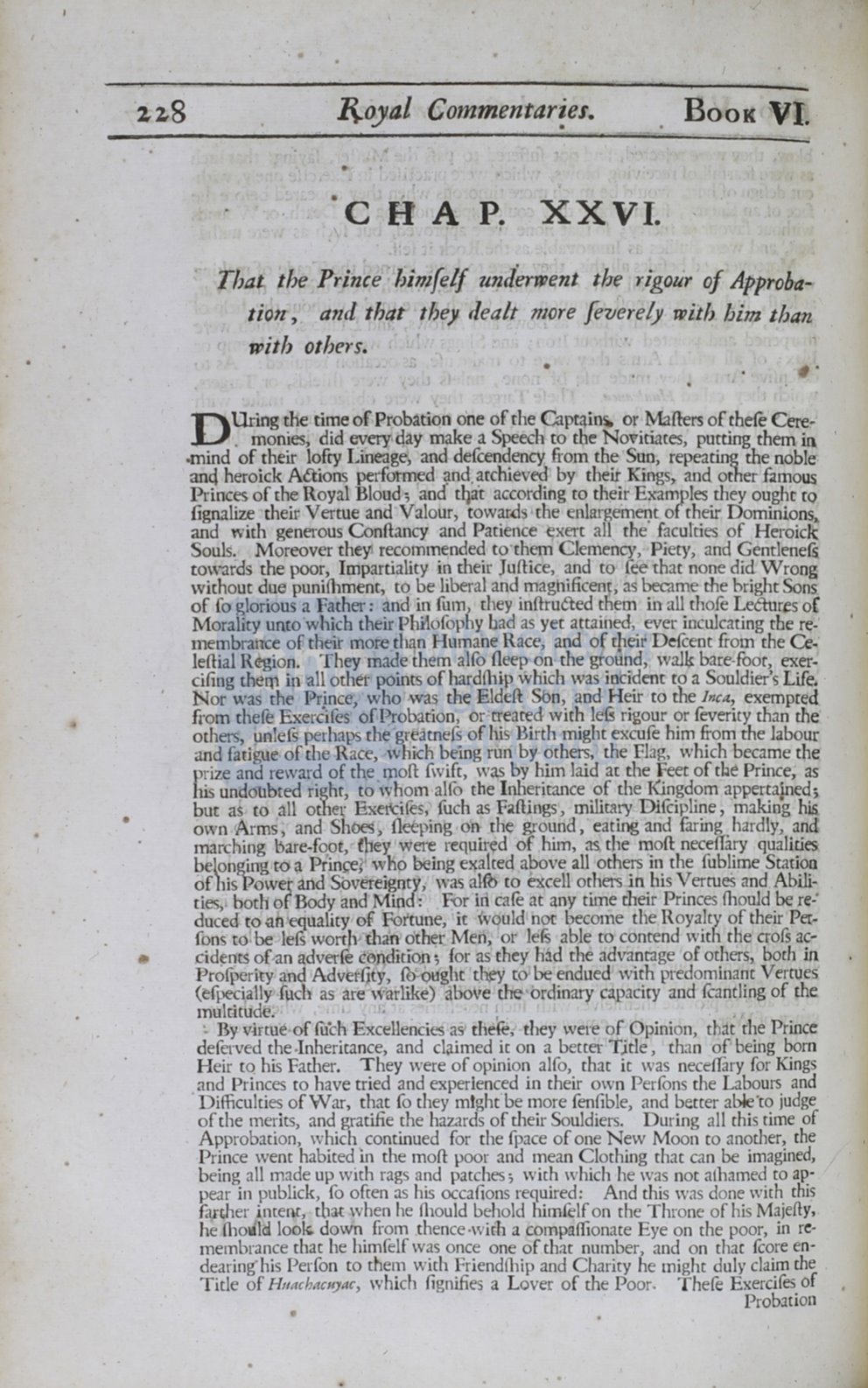

1\.oyal
Commentaries.
•
Boox VJ.
XXVI.
That
the
Frince
hitnfelf
und'erwent
the
rigour
of
Approha–
tiorz-,
and that
they dealt n1()re feverely with
him than.
with
others.
•
D
fuing
the time of Probation one of che
Oiptain or
Mafters
of
thefe Cere–
monies,
did every day
make a Speech to
the
otritiates, putting
them
in
·
mind of their lofiy Lineage, and defcendency
·om the Sun, repeating the noble
anq
heroick Altions performed ?Dd.
acchie
ed
by
their
Kings, and other famous
Princes of the Royal Bloud ; and that according
to
cbetr
Examples they oughr
to
fignalize
their Vertue and
alour, to
war~
the
enlargeme~t
of their Dominions,
and
with
generous Confiancy and Patience xert all the faculties of Heroick
ou1s. Moreover they recommended to·them
emency, Piety, and
GentlenefS
toward the poor, Impartiality in their Ju!Hce, and to
fee
that none did Wrong
without due punHhment, to be liberal and maghificent, as became the right Sons
of
fo
glorious a ather: and
in
furn,
they infrrntted them in all thofe Lettnres of
Morality unto which their Phifofophy bad as yet attained, ever inculcating rbe re–
membrance of their more than
uma-ne
ace, and of rpeir Defcent :from the
u–
lefiial
R~ion.
They made them alfo Geep on the groWld,
walk
bare-foot, exer–
clling
thelll
in
all other poin of hardfhip
hich
as incident to a Sonldier's Life.
or
v.
as rhe
F>r~nce,
who was the Eldeft bn, and Heir
to
the
Inca,
exempted
from thefe Exercifes ofProbation, or created- with
le~
rigour or feverity than the
others,
unlefi
perhaps the greatnefs of
his
Birth might excufe him from the labour
nd fatigue of the Race, " hich being run by others, the Fla ,
hich became the
rize and reward of the mofi fivifc, was by
him
laid at the eet of cbe Prince, as
his
undoubted right, to whom alfo the Inheritance of the Kingdom appertained;
but as to all
othe1:
fueocite
fuch
as Fafiings,
milirary
DifciJ)line, making his
o n Arms, and Sh€>eS, fleeping on the ground , eating and faring hardly, and
mar hing bare-foot,
tb€y
ere
required of
him,
as the moll: necelfary qualities
belonging
t-0
a Prin.ce5
ho 0eing exalted above all others
in
the fublime Station
of
his
Pow
et
and Sovereignty, was
aUb
to excell others in his
ercues and Abili–
ties, both ofBody and Mind:
r in care at any time their Princes fhould
be
re-·
duced to
as equality
of
For'tune,
it
would not become the Royalty of their
Per..
fon to be lefS worth than other Men, or le
able to contend with the crofs
ac–
cidents of an adverfe
cenditton ;
for as
they
had the advantage of others, both in
rofi
erity and AdverGty,
G
Ql1ghc
they
t
be
endued
ith predominant Vertues
(efpecially fuch as are
arlike) above
th
ordinary
capacity
and fcantling of the
multi
moo.
_
By v-irme of
Cuch
Excellenci
as chefe, they were of Opinion,
t
at
rhe Prince
deferved the Inheritance, and claimed it on a better Tjcle, than of being born
Heir to his Father. They were of opinion alfo, chat
it '
as neceffary for King
and Princes to have tried and experienced
in
their own Perfon the Labours and
Difficulties ofWar, that fo they mtght be more fenlible, and better a
·co judge
of the merits, and gratifie the hazards of their Souldiers. During all chis time of
Approbation, which continued for the fpace of one New Moon to another, the
Prince went habited m the moll: poor and mean
lothing that can
be
imagined,
being all made up with rags and patches;
ich which he ' as not aihamed to ap–
pear in publick, fo often as his occafions required: And chis was done with chis
farther ime
,
that
when he fhould behold him
If
on the Throne of his Majefiy,
he fho
lcl
look. down from thence
with
a compaffionate ye on the poor, in
re~
mem ranee that he himfelf was once one of that number, and on rhac fcore en–
dearing his Perfon to them with
riendfhip and Charity he might duly claim the
Title of
H11achacHyac,
\
hich fignifies a Lover of the Poor.
hefe Exercifes of
Probation














